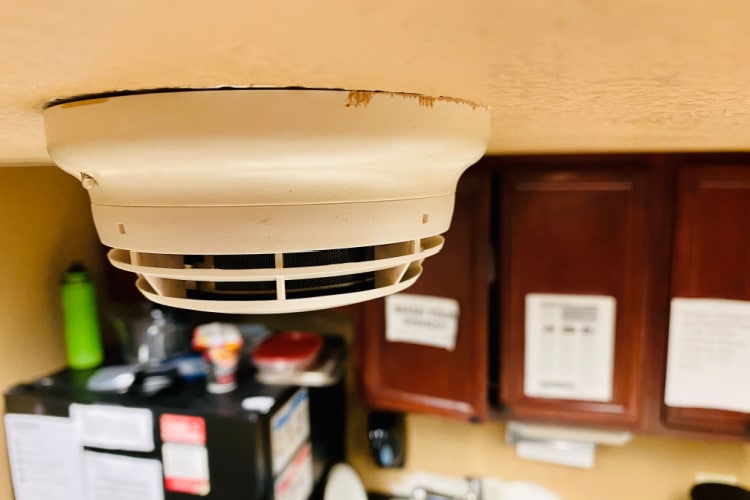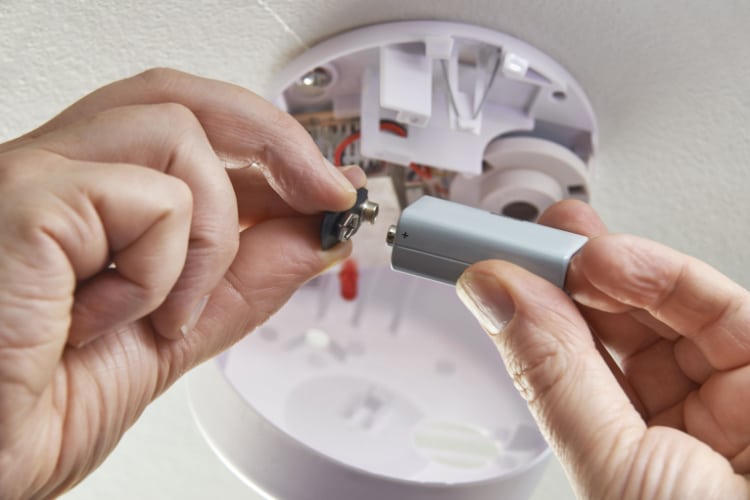Does a smoke alarm frequently wake you?
I know how frustrating it must be for you and your loved ones to hear the fire alarm and think: “What if there’s a fire?”, regardless of how often it happens.
You can put your worries to rest now; I’ll answer all your questions. Here’s what is really going on with your smoke alarm.

The Main Reason Why Hardwired Smoke Alarm Goes off at Night
The late-night alarm beep is a sound that many households have experienced. This usually happens for two reasons: the air temperature in your home and the battery life of your smoke alarm are low.
It’s said that the coldest hours for most houses are between 2 and 6 in the morning. The decrease in temperature affects the backup batteries in the smoke alarm.
Cold batteries can’t supply as much electricity as a normal-functioning smoke alarm needs. But once the battery is warmed up, it will restore regular operation.
If the backup batteries run low, the hardwired alarm system will beep to inform you of that. As a result, the alarm could start emitting beeps in the middle of the night to signal that the batteries are losing power and then stop when the temperature inside the house rises.
This is the primary cause, but there are other possibilities as to why your smoke alarm might ring in the middle of the night. Let’s learn more about the nature of hardwired smoke alarms and what you can do to end the constant beeping.
Hardwired Smoke Alarm 101
Hardwire smoke detectors are fueled by home circuits and inbuilt backup batteries that take over if the power supply fails.
There’s also another type of smoke detector that works entirely on batteries, also known as a “battery-powered smoke alarm.”
Both have the same appearance and are put in the exact locations. However, battery-powered smoke alarms aren’t connected to a circuit.
Hardwired alarms are very trustworthy since they are linked to a power source and backup battery, ensuring safety at all times, no matter the circumstance.
Another advantage of these types of alarms is that they are connected to each other throughout the house. This implies that all the alarms you have, not only those near a fire or smoke, will sound in case of an emergency.
However, most hardwired smoke detectors have a 10-year lifetime, as they feature non-removable batteries with a 10-year lifespan. As a result, the smoke detector as a whole has to be replaced with a new one after ten years.
Another thing to remember is that they have different kinds of beeps, and not all of them imply the same.
Different Types of Smoke Alarm Sounds
All in all, hardwired smoke alarms have three different sequences of beeps:
- Three beep sound sequence — smoke alarm
- Four beep sound sequence — also known as “T4,” is a carbon monoxide alarm
- One beep sound sequence — also known as “chirping,” is a sound that people may not recognize instantly, except by the fact it usually happens in the middle of the night. It often indicates that the battery is low, unable to work at full capacity, or nearly out of life. We’ll cover more of the potential causes of this beep in the section that follows.
Other Reasons Why Hardwired Smoke Alarm Keeps Going Off at Night
Here are the most probable reasons why your smoke alarm may be interrupting your late-night sleep, besides the cold and the potentially low battery.
1. There’s an Actual Fire in the House
First and foremost, check that there isn’t an actual fire in the house if your smoke alarm is beeping. If there is, phone the fire department, let everyone know, and leave the building for a safe location as soon as possible.
Although the most obvious, this is something you don’t want to skip as it’s vital to your safety! Once you are certain there is no fire in your house, you should look into some of the other potential causes of the beeping sound, so you know how to prevent them from happening in the future.
2. A Burned Late-Night Snack
Someone may have burnt their late-night snack because they were too tired to see what they were doing. The smoke detector could alert you of this!
Overall, you should install your smoke detector at least 10 feet from the kitchen. If the smoke detector is positioned closer than that, it will undoubtedly begin to sound as soon as it detects steam or burned food.
3. High Moisture Levels
Do you live with someone who enjoys late-night baths and showers? A smoke alarm may start to beep due to steam. Once you open the bathroom door and the steam spreads around, it might trigger the smoke alarm.
Steam and smoke are obviously significantly different, yet when they enter a smoke chamber, the smoke alarm cannot distinguish between them.
The same goes for humidifiers. They release steam and raise the moisture level in the house, thus triggering the beeps.
To prevent the beeps, turn on the bathroom vent to take care of the steam before it reaches the smoke alarm. As for humidifiers, place them at least 5ft away from a smoke alarm or turn them off completely.
4. Dirty Smoke Alarm
Maintaining your smoke alarm clean at all times is a must. Otherwise, the dust, dirt, and pollen the smoke chamber collects may trigger false alarms. Insects like spiders also like to make spiderwebs in there, turning smoke alarms into homes.
It’s recommended to clean your smoke alarm at least once a year. However, a quick clean with a vacuum or a keyboard cleaner every other month is even better! All you need to do is turn off the smoke alarm, remove it from the wires, clean it thoroughly, and bring it back up.
5. Expired Smoke Alarm
Smoke detectors that have reached their expiration date may also start to emit false alerts and finally stop functioning altogether. The typical lifespan of a hardwired smoke detector is 10 years.
The smoke alarm’s 10-year lifespan restriction sometimes causes the system to fail and finally lose its capacity to detect fires and distinguish between genuine danger and false threat.
The majority of hardwired smoke detectors also run on non-replaceable batteries. This battery also lasts for 10 years. Once worn off, the smoke sensor starts to beep to inform you that you have to install a new smoke alarm system.
How can you check the expiration date of a hardwired smoke alarm? Easy, twist the smoke alarm from the plate, remove its wires, and look for the expiration date printed on the back of the smoke alarm. If it’s expired, time to get a brand-new & improved design!
How to Reduce the Possibility of a Hardwired Smoke Alarm Going Off at Night?
Finally, the solution! Here’s how to prevent hardwired smoke alarms from beeping in the middle of the night.
- Do a monthly/quarterly performance test along with routine battery replacement.
- A system reset will instantly refresh the device and take care of any malfunctions. The reset button is typically located on the top of the gadget. However, older models may have one inside.
- Clean your hardwired smoke alarm regularly
- Install your hardwired smoke alarms 10 ft away from a bathroom and kitchen and 5 ft away from a humidifier
- Always make sure your smoke alarms are up-to-date

Conclusion
So there you have it! Now it’s up to you to find out what’s making all those late-night beeps on your smoke alarm system.
Maybe it’s a temperature drop or a burned late-night snack. Or perhaps your smoke alarm lifespan has come to an end. What about a humidifier? Are you sure you haven’t placed it near the smoke alarm?
Overall, the safest and most dependable smoke detector for your house is a hardwired smoke alarm. Your home’s hardwired smoke alarms are all connected to one another, so when one beeps, they all beep! Install smoke alarms in every hallway, inside each bedroom, and on every floor of your house, along with the basement, making sure they are at an appropriate distance from your kitchen and your humidifier. Now go ahead and find what’s causing the beeps!